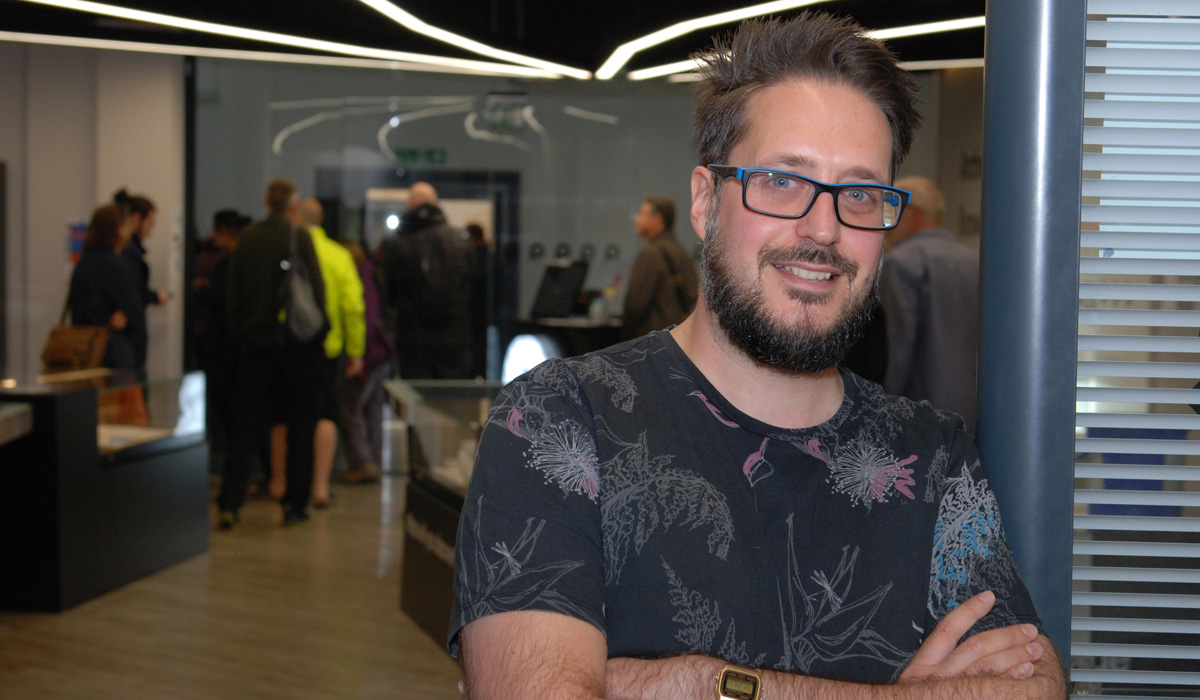 Dr Alex Bridger
Dr Alex BridgerThe congress now in its four year is organised by psychologist Dr Alex Bridger
HUNDREDS of people came to talk, to walk and to discover what local townscapes had to tell them when they attended the Fourth World Congress of Psychogeography at the University of Huddersfield.
Based at the University’s Heritage Quay archives centre – where delegates heard talks on topics that ranged from the meaning of retail environments to the relationship between man and dog while out walking – the event was co-organised by Dr Alex Bridger, a University of Huddersfield senior lecturer in psychology.
He is a leading academic proponent of psychogeography, which involves the exploration of urban environments and their meaning by taking walks that are often random and spontaneous. Dr Bridger is completing a book on the subject and hopes that the World Congress will lead to a publication. But he stresses that psychogeography is a subject that has a broad appeal and relevance.
“It attracts academics, but also artists and people who just like walking or wandering around towns. So we have tried to make the Congress as inclusive as possible,” said Dr Bridger, who organised the event alongside David Smith, Phil Wood, Tim Waters, John Billingsley and Graeme Murrell.
The Congress was attended by 300 in total, with substantial numbers attending the talks and taking part in the walks, which took them into Huddersfield town centre but also to the Colne Valley towns of Milnsbridge, Slaithwaite and Marsden, with their fascinating industrial and political heritage.
For example, there was a talk, described as a “detective story”, at the Red and Green Club in Milnsbridge from David Smith – Public Engagement Officer at Heritage Quay – that probed the riddle of Victor Grayson, the former Colne Valley socialist MP who mysteriously disappeared in 1920.
There were some 15 talks and discussion sessions on the first day of the Congress. They included a forum on post-industrial landscapes and a paper from Dr Bridger in which he described how psychogeography had been used as a way to document the experiences of LGBT people in Kirklees.
The second day of the Congress offered a series of walks and also a bus ride up and down the Colne Valley, observing its social spaces.
“This demonstrated that psychogeography is not just about able-bodied experience but that people who maybe have certain disabilities or difficulty with walking can sit on a bus and do psychogeographical projects,” said Dr Bridger.
When the World Congresses originated, the title was tongue-in-cheek, he added.
“It was basically a meeting of friends and colleagues, but last year and this year we have had people attending from overseas countries including Italy and Slovenia.” Also, there were talks describing psychogeography projects in the USA and Turkey.
Dr Bridger is keen to stress the academic legitimacy of psychogeography, but the subject retains a playful side. For example, when the event is repeated next year it might be billed again as the Fourth World Congress.
“There wasn’t any closing ceremony…so it’s not actually finished!” said Dr Bridger.
More news
New generation of psychologists meet for PsyPAG
A group of psychology postgraduates earned the right to stage the prestigious annual PsyPAG 2018 conference, attended by 200 researchers
Urban design and pro-social design to reduce crime
Crime Prevention Through Pro-Social Design recognises that the offender is very likely to be part of our community
Artificial Intelligence to help prevent suicide
Professor Grigoris Antoniou led the work with South West Yorkshire Partnership NHS Foundation Trust
